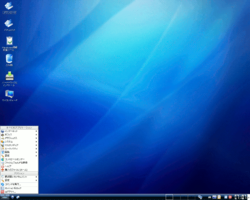Turbolinux, Inc. era
In 1999-06-08, Pacific HiTech announced its name is changed to Turbolinux, Inc., coinciding its expansion of its North American operations. [11]
In January 2000, Turbolinux received $57 million in investment from Compaq Computer, Dell Computer, Intel, and other companies. [12]
The Millers were "terminated without cause" from Turbolinux in July 2000 [13] after a disagreement with venture capitalists. [14]
In October 2000, the company filed an S-1 with the Securities and Exchange Commission. [15] The S-1 indicates that revenue was $2.932 million for the six months ended June 30, 2000. [16]
After several rounds of layoffs, Turbolinux, Inc. and Software Research Associates, Inc. announced in 2002-08-20 the acquisition of Turbolinux, Inc. by Japan-based Software Research Associates, Inc. (SRA). The transferred company would retain a U.S. office, and became SRA's fully owned subsidiary. [17] [18] The acquisition was originally set to 100,000 shares (100% stake) for ¥100,000,000, [8] but final cost was ¥150,000,000. [19] In 2002-09-04, Turbolinux, Inc. announced renaming of TurboLinux Japan, K.K. to Turbolinux, Inc. that had taken place 3 days earlier. [20] The US Turbolinux was renamed to Centerlex, and would continue the server provisioning software business based on the PowerCockpit product line, which SRA did not purchase. [21] [22] [23] In 2003-02-25, Mountain View Data, Inc. announced the acquisition of PowerCockpit. [24] [25] The acquisition affected PowerCockpit versions 2.0 of above. [26]
In 2004-03-15, livedoor Co., Ltd. and Software Research Associates, Inc. announced the complete acquisition of Turbolinux, Inc. by livedoor, with transaction set to close in 2004-05-06. [27] [28]
In 2005-08-05, Turbolinux, Inc. announced issuing 10,000 new shares of common stock to be available to apply between 2005-09-08 and 2005-09-12, and livedoor Co., Ltd. selling 9,000 shares of common stock to public in 2005-09-15. [29] In 2005-09-07, Turbolinux, Inc. announced the offered stock price to be ¥100,000 per share. [30]
Turbolinux completed an IPO on the Osaka Stock Exchange in September 2005 underwritten by Nikko Citigroup, Livedoor Securities Co. Ltd., and Mizuho Investors Securities Co., Ltd. [31]
In 2009-05-01, TL HOLDINGS, Inc./TL Holdings Corporation (TLホールディングス株式会社) announced Turbolinux, Inc. would be run under holding company structure, with TurboLinux Inc., Turbo Solutions Co., Ltd., Zend Japan Ltd., and other overseas group enterprises being subsidiaries of TL HOLDINGS, Inc. [32]
In 2009-05-18, TL HOLDINGS, Inc. announced relocation of Turbolinux, Inc., effective 2009-06-01. [33]
In 2013-03-31, TL HOLDINGS, Inc. announced it would be renamed from TL HOLDINGS, Inc. (TLホールディングス株式会社) to TurbolinuxHD Corporation (ターボリナックスHD株式会社) in 2013-04-01. [34]
In 2014-04-01, GEONEXT Corporation announced renaming from TurbolinuxHD Corporation (ターボリナックスHD株式会社) to GEONEXT Corporation (株式会社ジオネクスト) in the same day. [35]
In 2019-04-01, FHT holdings Corp. announced renaming from GEONEXT Corporation to FHT holdings Corp. (株式会社FHTホールディングス) in the same day. [36]
Dissolution
On 2019-10-15, FHT holdings Corp. announced the dissolution of Turbolinux, Inc., with dissolution set at 2019-12-31, and liquidation ending at the end of March 2020. The remaining Turbolinux assets were to be sold to Turbo Systems Co., Ltd. [37]
